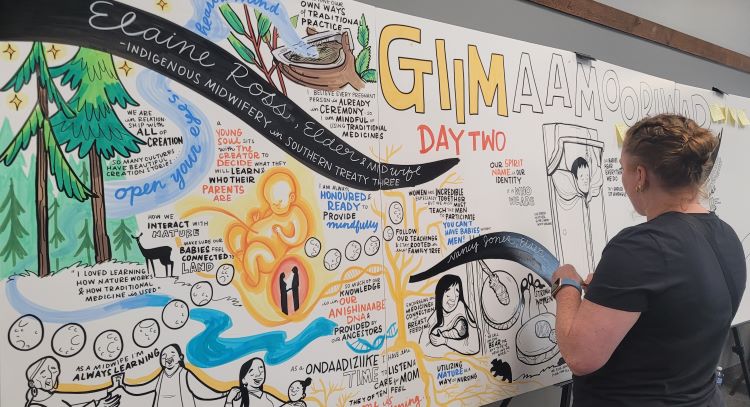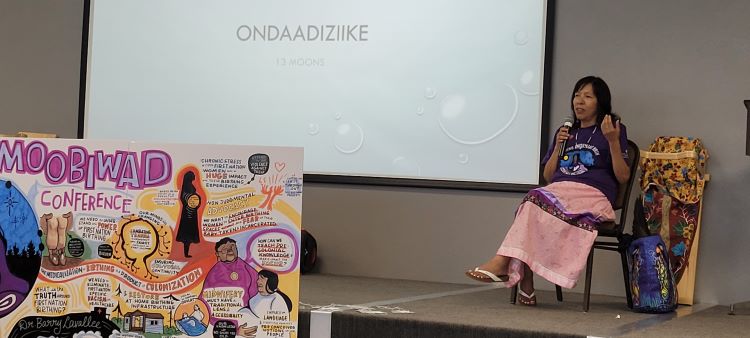The Giimaamoobiwad Conference: Inspiring community-led birthwork and sharing stories about pathways to midwifery

September 25, 2024
Top image: Artist from ThinkLink Graphics live-capturing details and stories from the gathering.
Anishinaabe midwife and Elder Elaine Ross has been providing birthing care in Treaty #3 territory, a large area covering northwestern Ontario and southwestern Manitoba, for the past couple years and most recently has been working with Giishkaandago'ikwe Health Services as a midwife to serve Southern Treaty #3 communities. Seeing the potential for a resurgence in the territory and repeatedly hearing how important Indigenous midwifery and birthwork is, Elaine led the way for the Giimaamoobiwad (“Gathering”) Conference to be birthed.
The three-day conference took place Sep. 10-12, 2024, bringing together representatives from Southern Treaty #3 communities and partners to promote Indigenous midwifery and inspire community-led birthwork. With over 100 people in attendance, representatives included Indigenous Healthy Baby Healthy Children workers, health directors, community health nurses, dietitians, leadership, Indigenous midwifery teams and local physicians. With the help of the Maternal Child Health Team at Giishkaandago'ikwe Health Services, Elaine rallied together an impressive lineup of experts to highlight the diverse pathways to becoming a midwife, unique models of Indigenous midwifery care and importance of Indigenous midwifery in decolonizing health care.
The conference opened with the drum and traditional protocol led by Elder Margaret Ottertail to begin the gathering in a positive and good way. Gaakinawataagizod Cheyenne Vandermeer, representing Grand Council Treaty #3, welcomed the participants to Treaty #3 Territory on Rainy Lake and acknowledged the importance of Indigenous midwifery and restoring traditional birthing care for families to live well.
Milicent Simenson, traditional midwife and co-founder of Mewinzha Ondaadiziike Wigamiig in Bemidji, Minnesota, and Tallie Large-Devault started the conference off with the story of Tallie’s lodge birth. Tallie gathered her helpers and, using the knowledge she had gained from ancestors, built a lodge and gave birth in this ceremonial space.
Dr. Barry Lavallee, Metis from Manitoba, spoke to issues within the current health-care systems, including racism that disproportionately affects First Nation peoples and their access to safe care. To advance the health of First Nations peoples, he stressed, we must address the colonization of the systems that have been created to harm First Nations peoples.

On the second day, Elaine Ross shared teachings around the thirteen moons and the creation story, leading into how these teachings have guided her midwifery practice. The knowledge she has been gaining over the years continues to contribute to her journey as a midwife – all the time she has spent on the land learning from the plants, sitting in ceremony with elders, raising her own children and learning from other Indigenous midwives in North America has been part of her education.
Anishinaabe teachings continued with Elder Nancy Jones from Nigigoonsiminkaaning sharing the story of birthing her twin sons on the trapline and emphasizing the importance of teaching young people the ‘why’ behind Anishinaabe protocols, such as offering asemaa (tobacco) and the importance of Spirit Names. To wrap up the morning, participants enjoyed listening to the healing songs by local Anishinaabe’kwe hand drum group.
Participants spent the afternoon learning from the team of Indigenous midwives from D’ilico Family Health Team – Lisa Bishop, Amy Pelletier and Suzanne Fitzgerald – alongside Dr. Naana Jumaah (Ob/Gyn), who all shared their individual journeys to their current work in reproductive health care and articulated how effective collaboration and integration of cultural care can improve the experience and outcomes for birthing families. Lisa highlighted one of their team’s greatest accomplishments is gaining the trust of the families, allowing them to build lasting relationships with clients.
Darlene Birch, Indigenous Midwife from Manitoba, engaged the audience with the inspiring story of her path to becoming a midwife. Her personal commitment to birthing her children in her home with only her husband led to her being invited to births by neighbours and family members. She found herself getting more involved and gaining more skills, eventually seeking more training and knowledge from her elders to work as a midwife. She was part of the leadership that birthed the Indigenous midwifery program at the University College of the North that was training midwives from a community lens rooted in culture, utilizing curriculum standards from Ontario and New Zealand, before the program was defunded. Darlene continues to support Indigenous midwifery development through her involvement with the National Council of Indigenous Midwives (NCIM) Indigenous Midwifery Education program.
Dr. Karen Lawford, Indigenous Registered Midwife and Assistant Professor at McMaster University, set the context for the third day of the conference by sharing her research project, Returning Care and Health Home (RCHH): An Indigenous Health Commitment. Reflecting on the personal impact of this work, she shifted the direction of her research efforts and posed the question, ‘What do you desire?’ emphasizing that we need to look beyond the current system that is violent and restrictive to Indigenous Peoples and look toward creating Indigenous-led systems rooted in culture.
The conference wrapped up with small-group discussions about how to move birthwork and midwifery forward in the territory. The need to improve experiences, build practices rooted in culture and ensure safety for Indigenous families accessing birthing care was evident. A few commonly shared solutions included:
- having Indigenous midwives and birthworkers available to every community
- supporting birth in community
- developing a holistic circle of care
- supporting Indigenous leaders to advocate for change
- continuing to create opportunities for sharing and collaboration
Chi Miigwech to Giishkaandago'ikwe Health Services staff, all the speakers and the participants for their commitment to supporting the growth of Indigenous midwifery.
